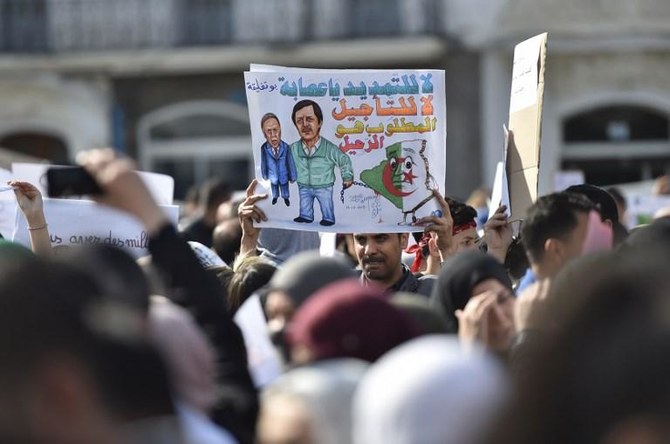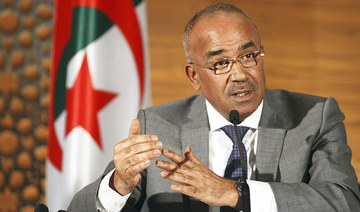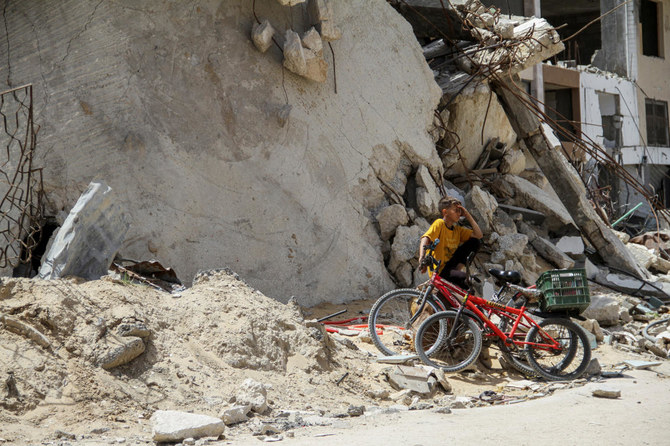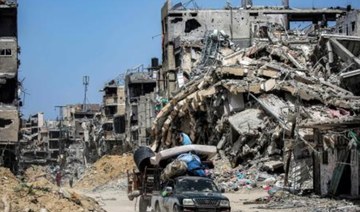ALGIERS: Thousands of students, university professors and health workers rallied in Algiers on Tuesday calling for President Abdelaziz Bouteflika to quit, and a new group headed by activists and opposition figures told the army not to interfere.
In the first direct message to the generals from leaders emerging from nearly a month of mass protests against Bouteflika, the National Coordination for Change said the military should “play its constitutional role without interfering in the people’s choice.”
Bouteflika, who has ruled for 20 years, bowed to the protesters last week by announcing he would not stand for another term. But he stopped short of stepping down immediately and said he would stay in office until a new constitution is adopted, effectively extending his present term.
His moves have done nothing to halt demonstrations, which peaked on Friday with hundreds of thousands of protesters on the streets of Algiers and have continued into this week.
“We will not stop our pressure until he (Bouteflika) goes,” said student Ali Adjimi, 23. “The people want you to leave,” read a banner. Others shouted “the people and the army are one.”
The 82-year-old president has rarely been seen in public since suffering a stroke in 2013.
The protesters say he is in no fit health to rule. Djilali Bahi, one of the doctors and other health workers at Tuesday’s demonstration, said: “We are fed up with this system. It must disappear forever.”
So far, soldiers have stayed in their barracks during the protests. But on Monday, Chief of Staff Lt. Gen. Ahmed Gaed Salah hinted at a more active role, saying the army should take responsibility for finding a quick solution to the crisis.
Generals have traditionally wielded power behind the scenes in Algeria and have publicly intervened during pivotal moments, including cancelling an election in the early 1990s that hard-liners were poised to win, triggering a decade of civil war.
The protest leaders issued their statement titled “Platform of Change” late on Monday, demanding that Bouteflika step down before the end of his term on April 28 and the government resign immediately.
Bouteflika’s newly appointed Deputy Prime Minister, Ramtane Lamamra, has launched a tour of allied countries seeking support. On Tuesday he visited Moscow, long a close military ally of Algeria.
Foreign Minister Sergei Lavrov said Russia was concerned by the protests: “We see attempts to destabilize the situation, and speak out against any interference in this process,” he said.
He said Moscow supported the Algerian government’s initiative to hold talks with the opposition after weeks of protests.
Lamamra defended the government’s reform proposals. Bouteflika has agreed to hand over power to an elected president, and the opposition will be allowed to take part in the Cabinet that will oversee elections, he said at a joint press conference with Lavrov.
Protesters have been calling for a generation of new leaders to replace a ruling elite dominated by the military, big businessmen with ties to the establishment and veterans of the 1954-1962 war of independence against France.
Algerian authorities have long been adept at manipulating a weak and disorganised opposition. But the mass demonstrations have emboldened well-known figures to lead the reform drive.
Prominent members of the new group include lawyer and activist Mustapha Bouchachi, opposition leader Karim Tabou and former Treasury Minister Ali Benouari, as well as Mourad Dhina and Kamel Guemazi, who belong to an outlawed radical party.
Zoubida Assoul, leader of a small political party, is the only woman in the group so far.
“Bouteflika just trampled on the constitution after he decided to extend his fourth term,” said the National Coordination for Change.
With dark memories of the 1990s civil war which cost an estimated 200,000 lives, many Algerians have long placed a priority on stability.
Bouteflika survived protests during the 2011 “Arab Spring” uprisings that toppled other regional leaders, using oil and gas wealth to buy support and the security services to tamp down dissent. But with the economy disappointing in recent years and a younger generation less fearful of change, he has yet to formulate a strategy that can placate Algerians.
“A free and democratic Algeria,” doctors chanted at the demonstrations.



























